In early July, 1967, I sat at breakfast in the dining car of the Orient Express train from Paris to Salzburg, Austria. The train rolled rhythmically along a mountain river, with a lot of white water. Across the river, a narrow road lined by Swiss chalets, white stucco, brown roofs, red flowers hanging out of their windows. Above, rising behind, the alps with craggy and snowy peaks at the top. I floated, elated, the joy of that morning mixed with the realization that I had a whole year of it coming.
We’d arrived in Europe via the U.S.S. United States, an ocean liner. Notre Dame sent us on the ship because in 1967 the ocean trip was cheaper than flying. We’d met in New York to take the ship. We were 36 19-year-old Notre Dame boys, in second class, suddenly subjected to free beer and hard drinks, free movies, free food, free everything except girls. The few young eligible girls on that boat were subjected to constant attention from our group. So, no onboard romances for any of us. But we knew each other from German classes all the previous year, so there were always friendly Notre-Dame-group faces in any of the bars, restaurants, movie theaters, and on the deck and in the pool/gym. Like most of us, I failed to enjoy it fully because I just couldn’t wait for arrival in Europe.
The last night on the ship, we stayed up all night, in awe of what we were doing and where we were going, as the big ship unloaded passengers at Southampton first, then went on to Le Havre, where we arrived in the wee hours of the morning.
I spent the train ride from there to Paris struggling to stay awake and failing. Then we were in Paris; Notre Dame, Champs Elysee, Montmarte. I staggered through the sites, a few of us together, and barely survived the long day in Paris before crashing that night in a sleeper car of the Orient Express, which left Paris at 8 that evening.
So, it really hit me that next morning, waking up in Switzerland. It all seemed magic. Swiss Alps. Europe. The Orient Express. And that, just the first day of a whole year.
We spent the rest of the summer in Salzburg learning more German language. We lived in a reconfigured stable-turned-school. The school, all single story buildings including dorms and classrooms, was on the grounds of Schloss Klessheim, a 17th century baroque mansion that appeared as one of the sets of the movie The Sound of Music, set in Salzburg.
It was about a quarter mile or so downhill to a small village, with a single store and half a dozen houses, and a Gasthof beer place that became a favorite haunt very quickly. Where we lived was also about mile’s walk from the old-town view of the castle from the river. The walk took us through a long tree-lined street, then some village houses. It came up to the river and castle view as encountered one of our favorite beer places. That bier garden had an outside section under big shade trees, perfect for summer weather. An Austrian Schilling was worth four US pennies, and a two-liter beer stein came for 20 schillings, so, 80 cents. Welcome to Austria in 1967. As a 19-year-old kid.
The picture here is from Schloss Klessheim. I’m there with my shirt off.
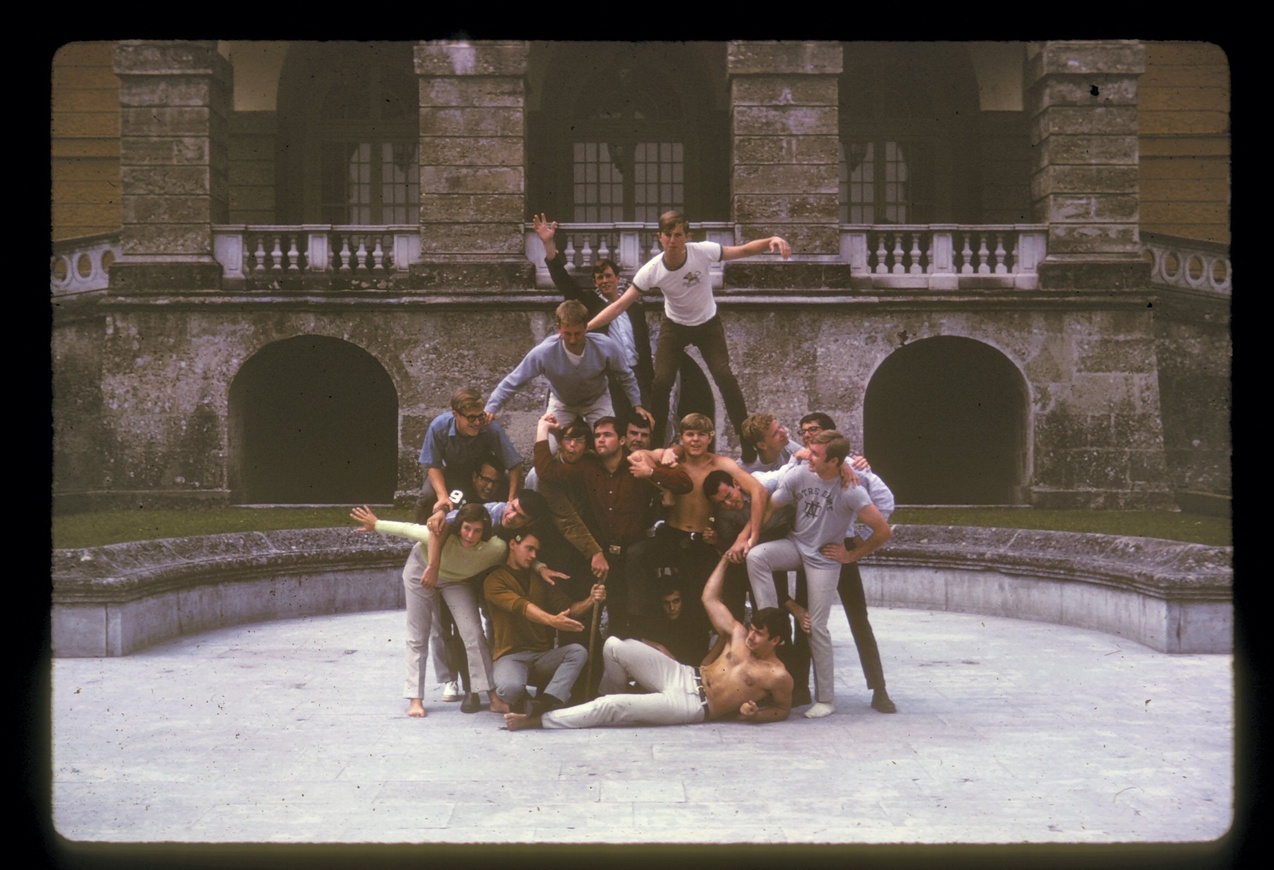
These two are from the walk down town along the river:
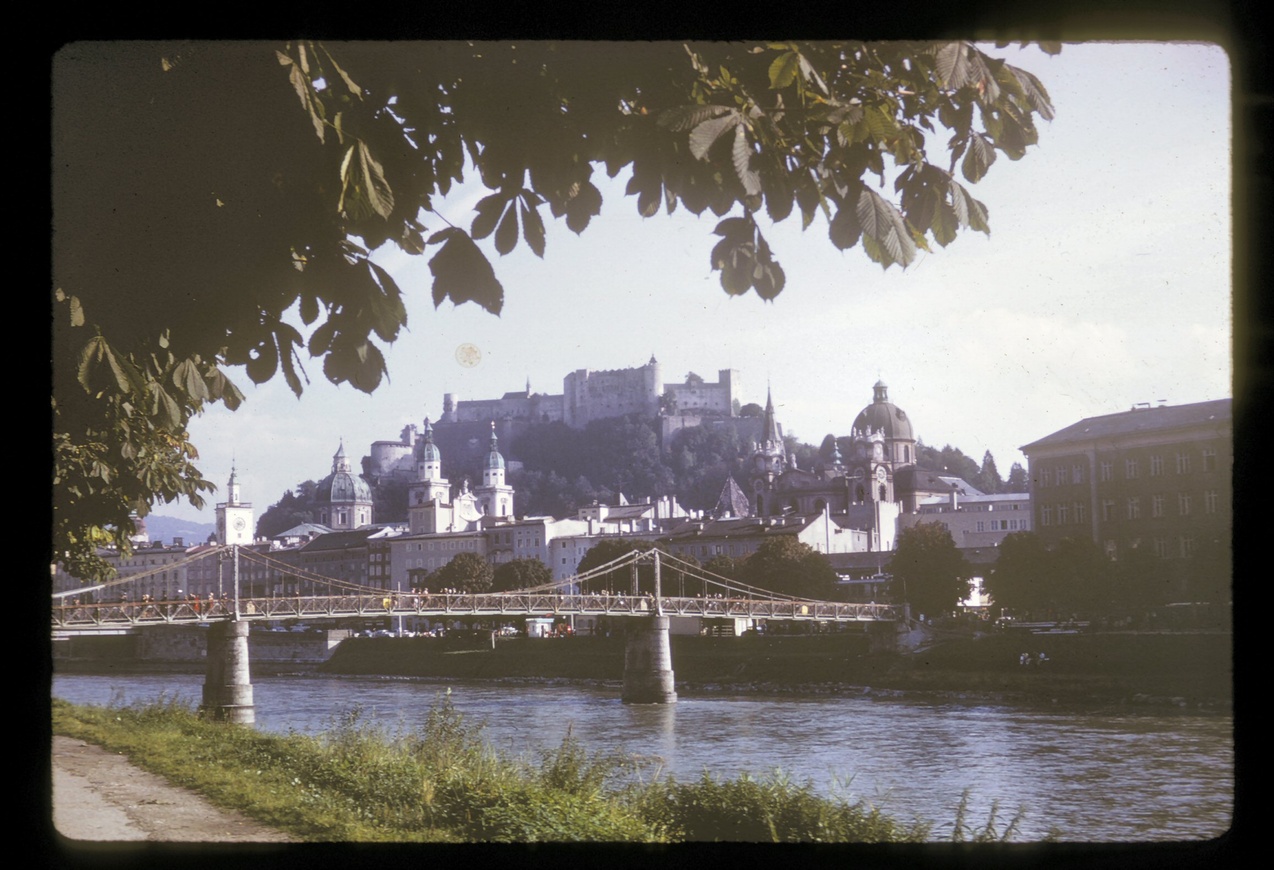
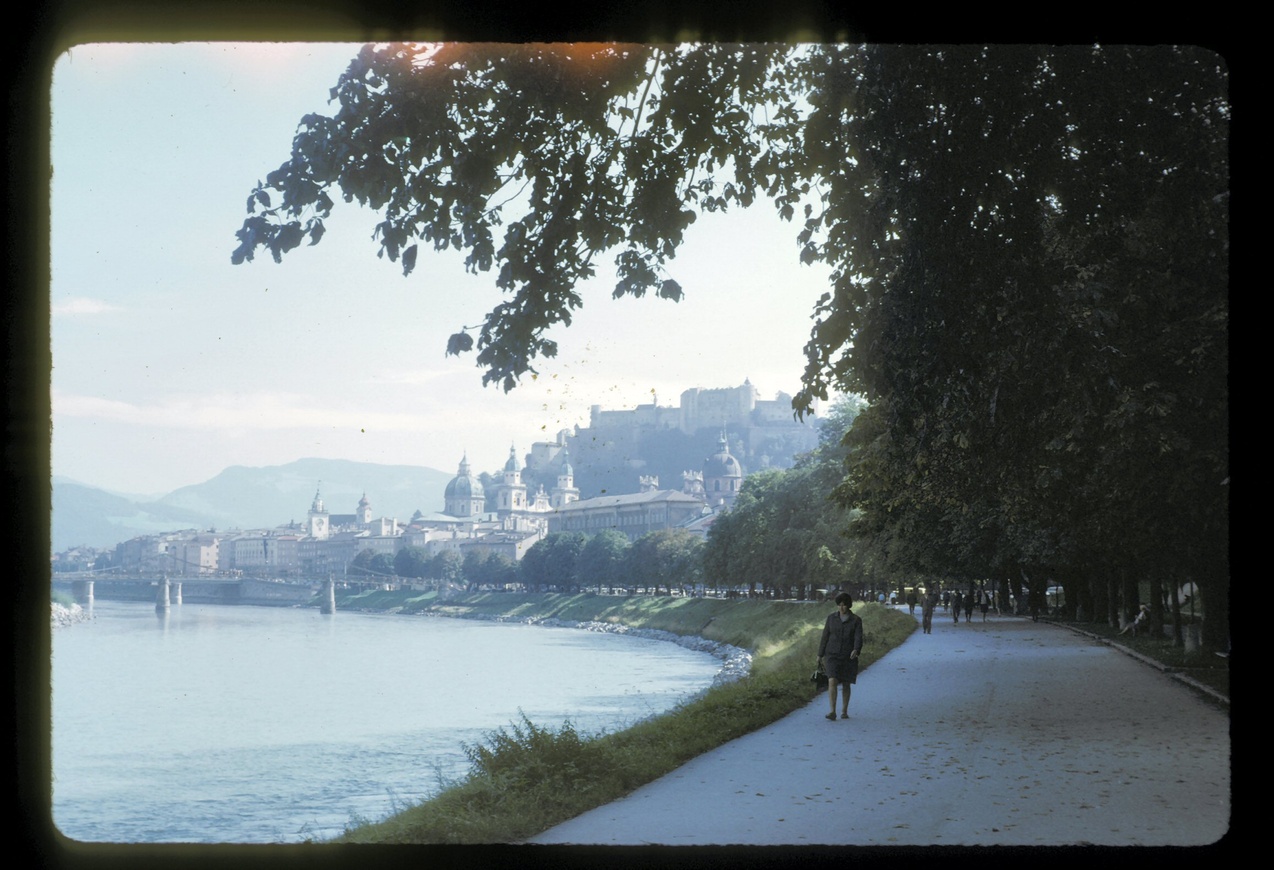
And one final picture of Salzburg in 1967:
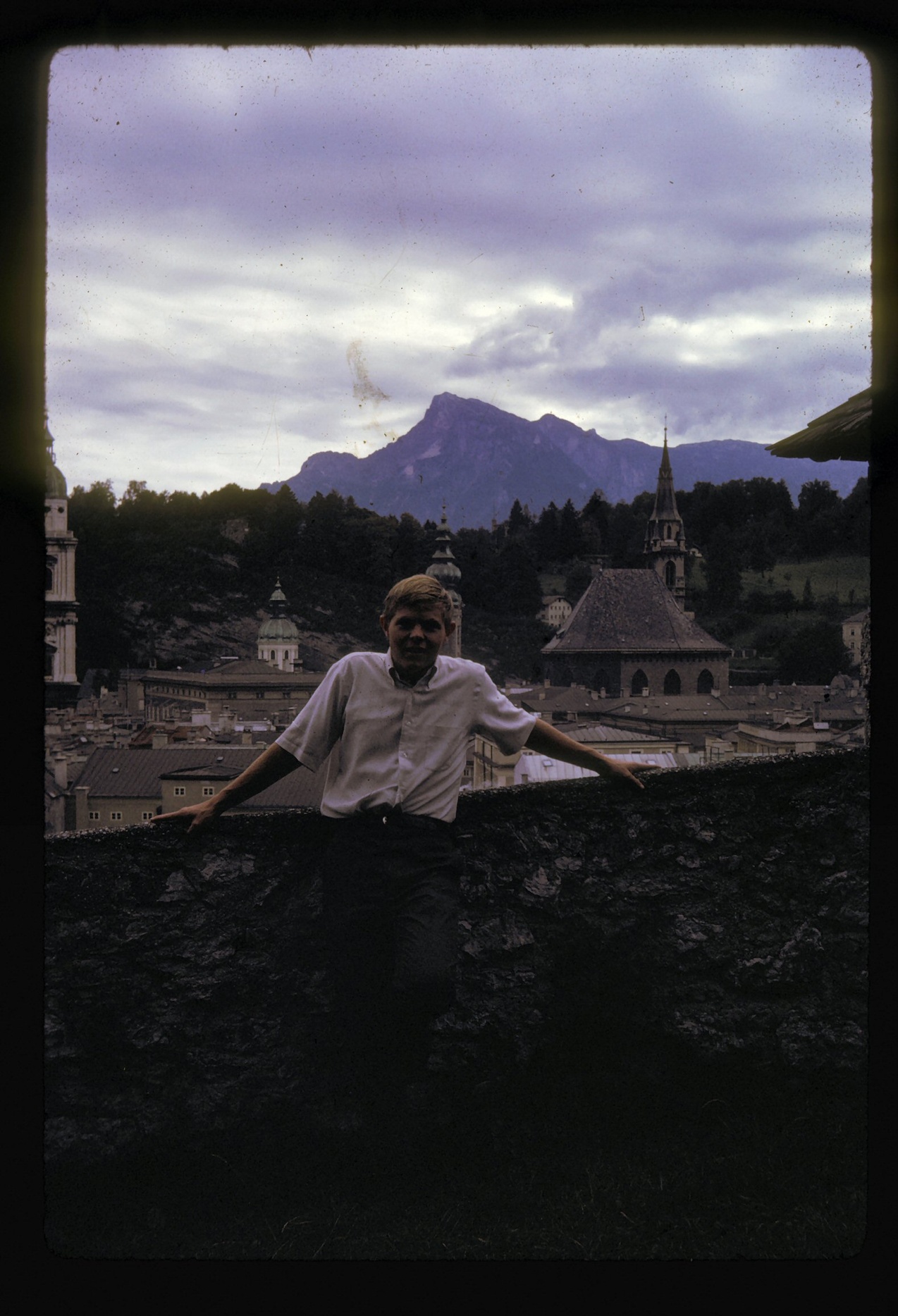
After eight weeks in Salzburg, before settling in Innsbruck, we had three weeks of vacation. Jim O’Connell and I took off hitchhiking, living the dream. “Hitchhiking in Europe” was something students did back then. It was considered safe. And “Europe on $5 a Day” was all the rage, an extremely popular travel book.
Jim and I discovered together that hitchhiking, although it worked, also meant a lot of time waiting around at the highway entrances outside the city. And $5 a day meant some pretty dreary youth hostels, generally dark, dirty, and dorm-like if dorms had been fixed up in 500-year-old crusty damp old cities.
We hitchhiked up the so-called “Romantic Road” in central Germany going north from outside Munich to east of Frankfurt. The highlight for us was Rothenburg am Tauber, where we ditched the youth hostel and rented an actual hotel room, with two feather beds, for about $3. It’s a gorgeous town completely surrounded by ancient medieval walls.
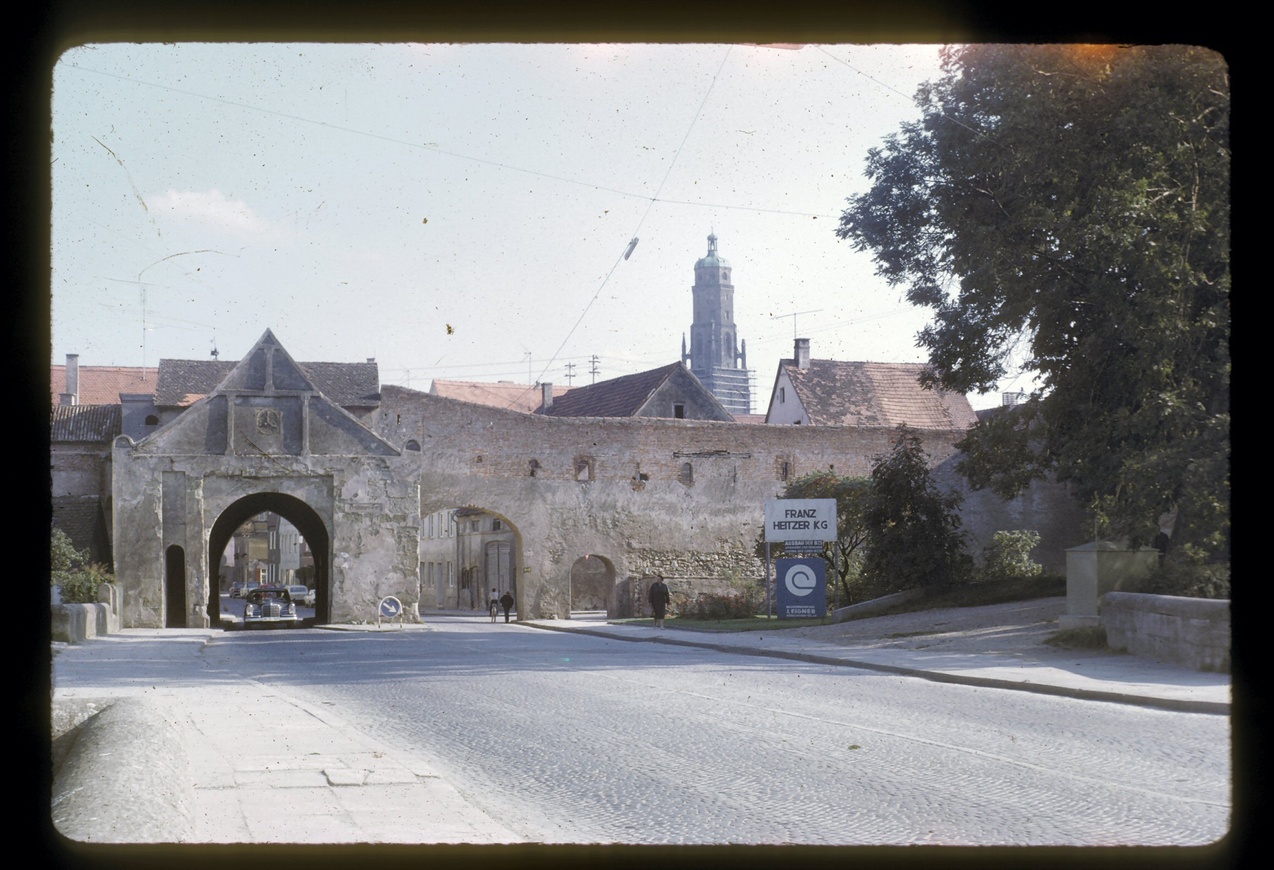
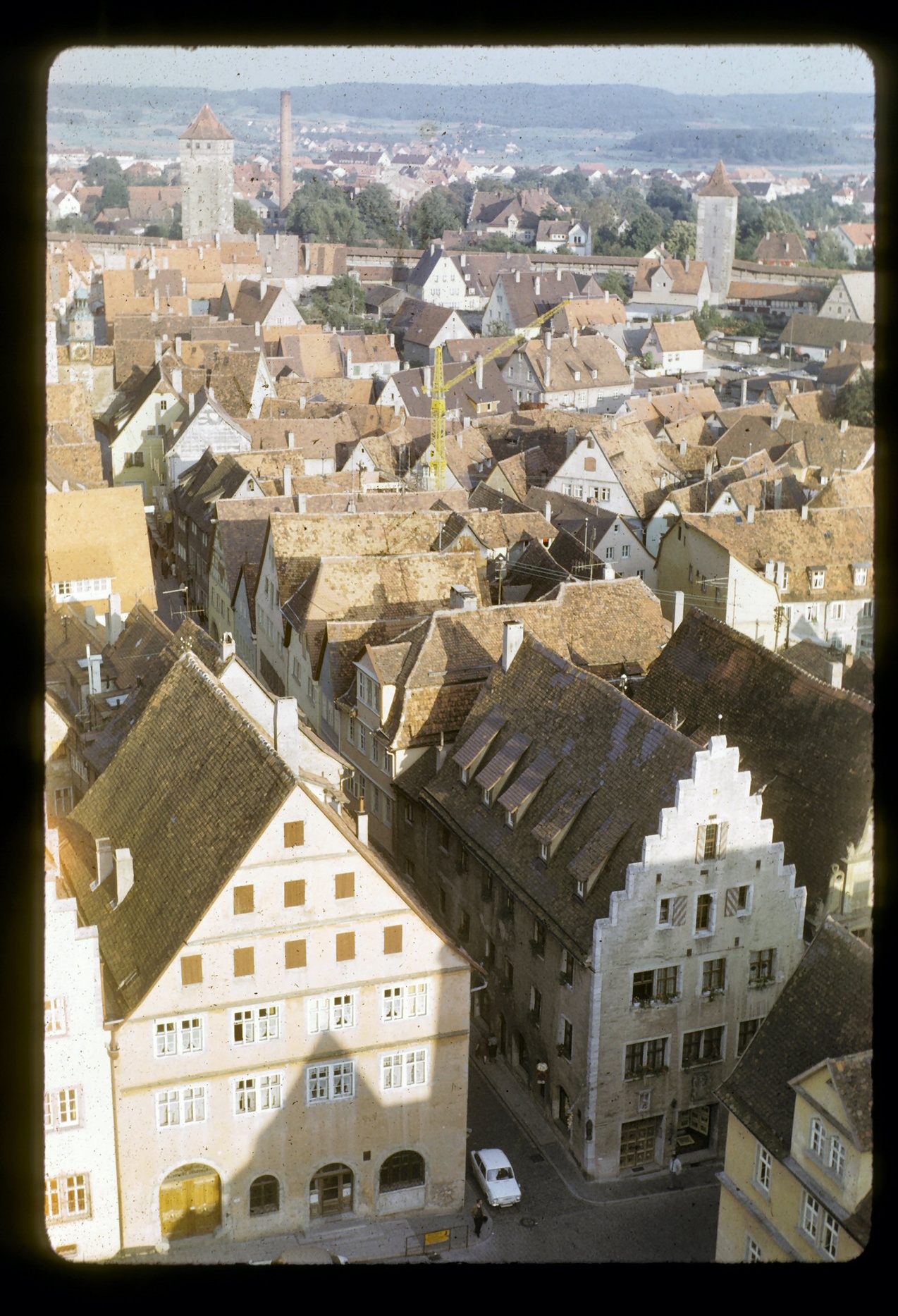
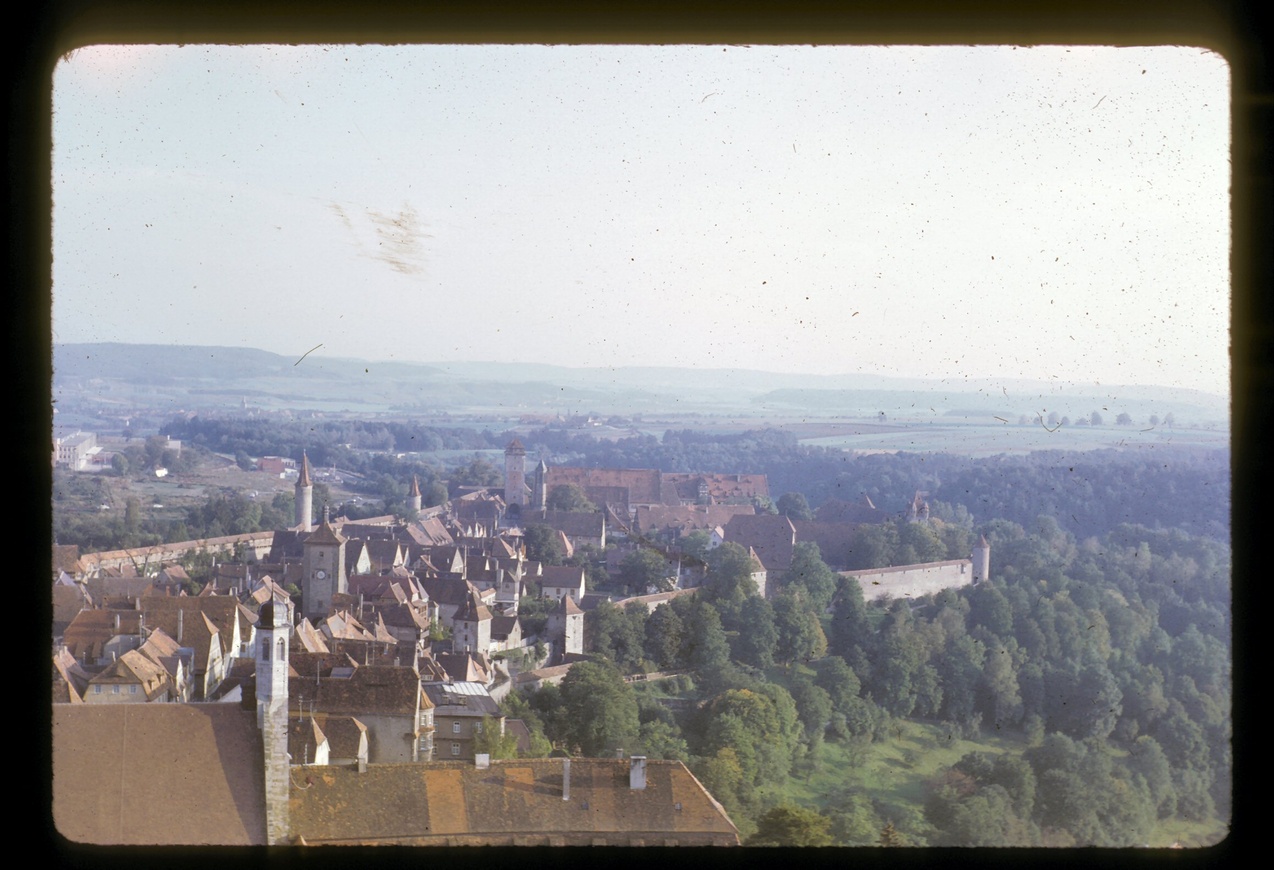
We did manage to take a boat up the Rhine river, from Frankfurt to Cologne.
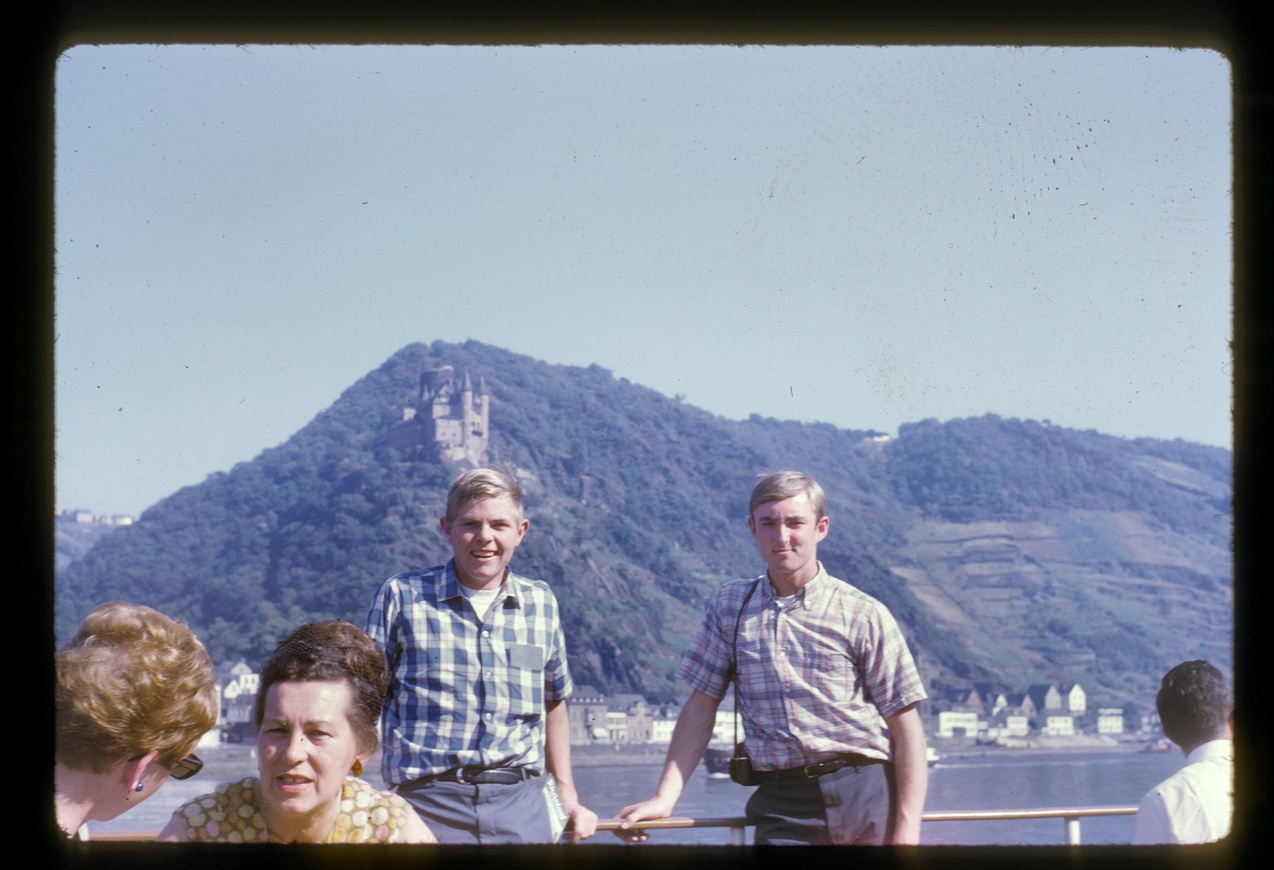
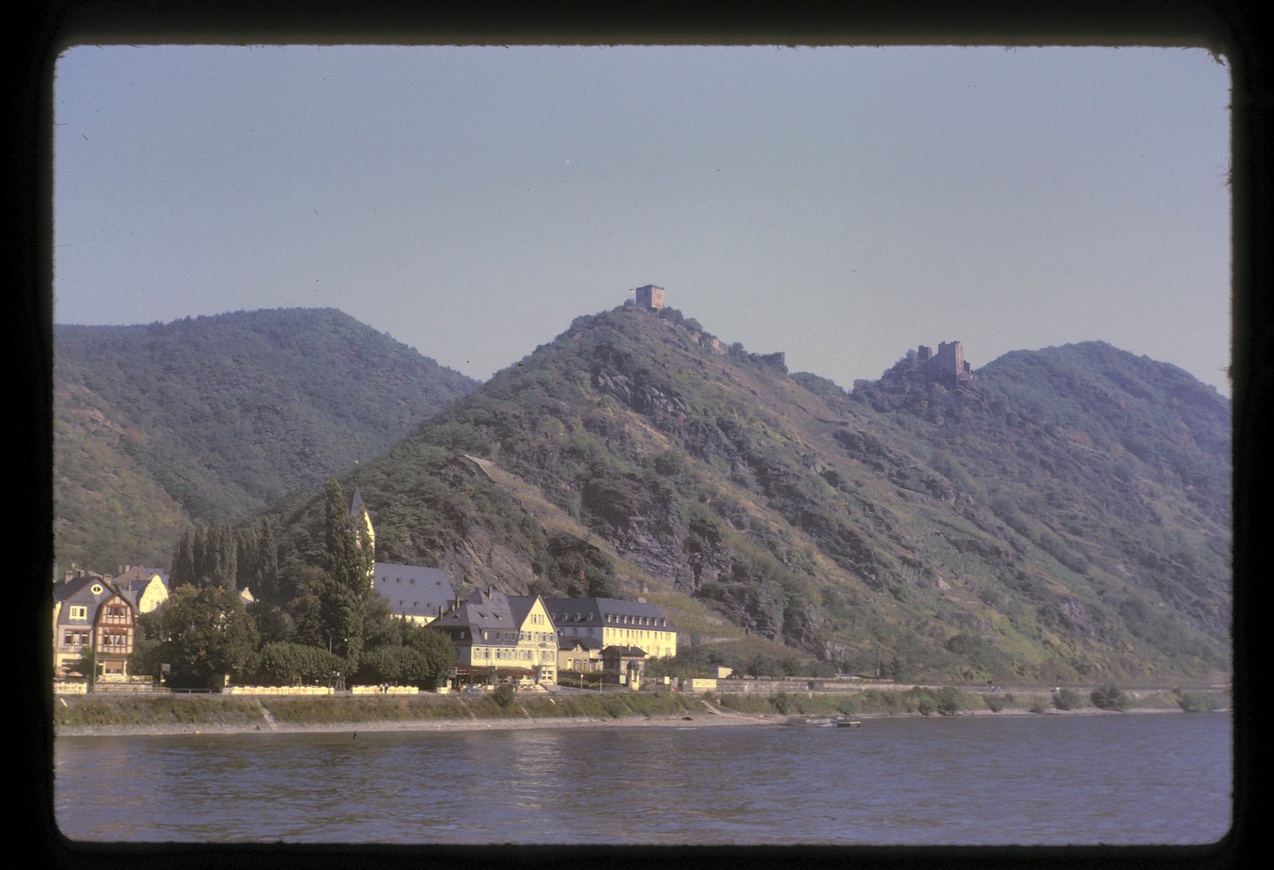
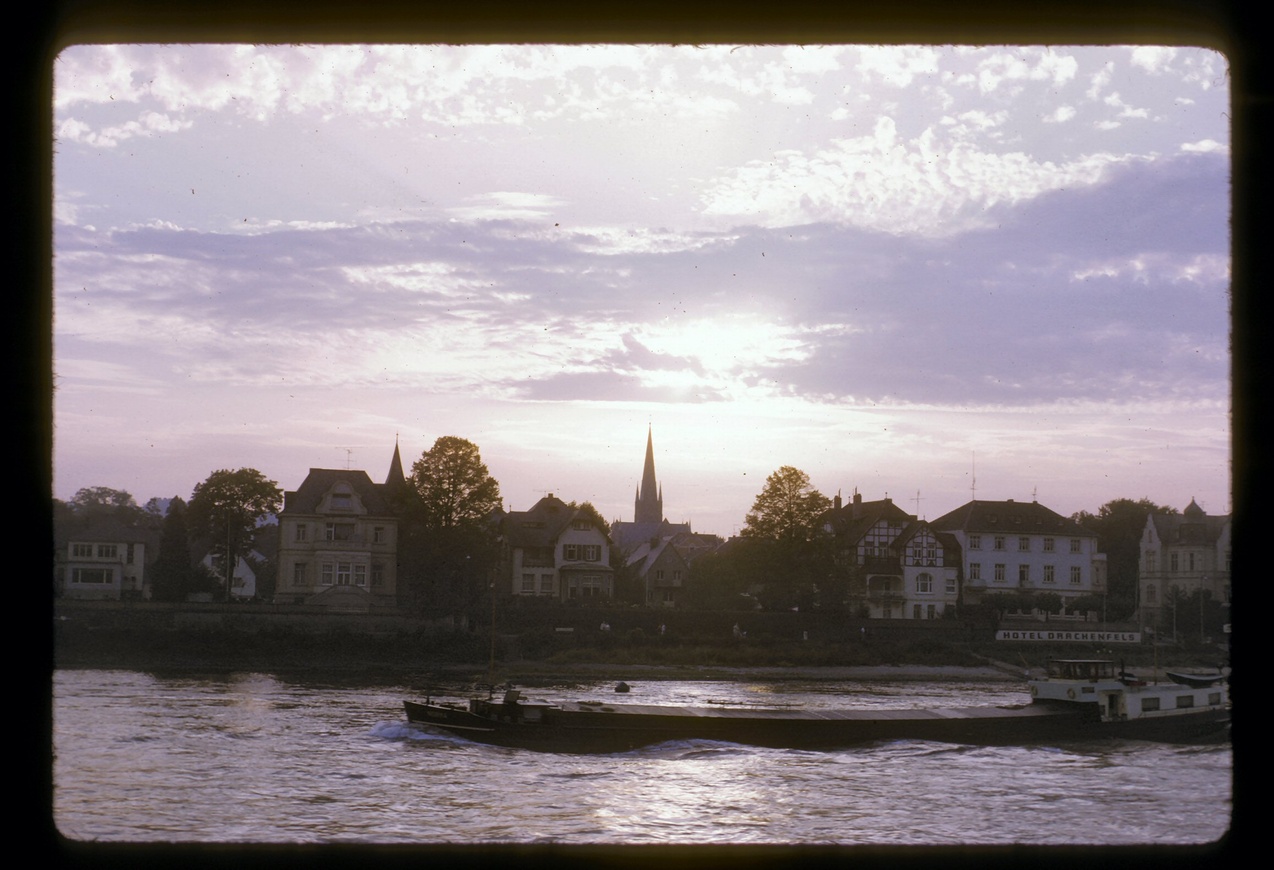
We spent the school year in Innsbruck, taking classes in the university. Ten of us lived in a widow’s big home at Schmelzer Gasse 2, about a mile downriver from the university, a pleasant walk away, through the old town and along the river.
The picture here is the house we lived in:
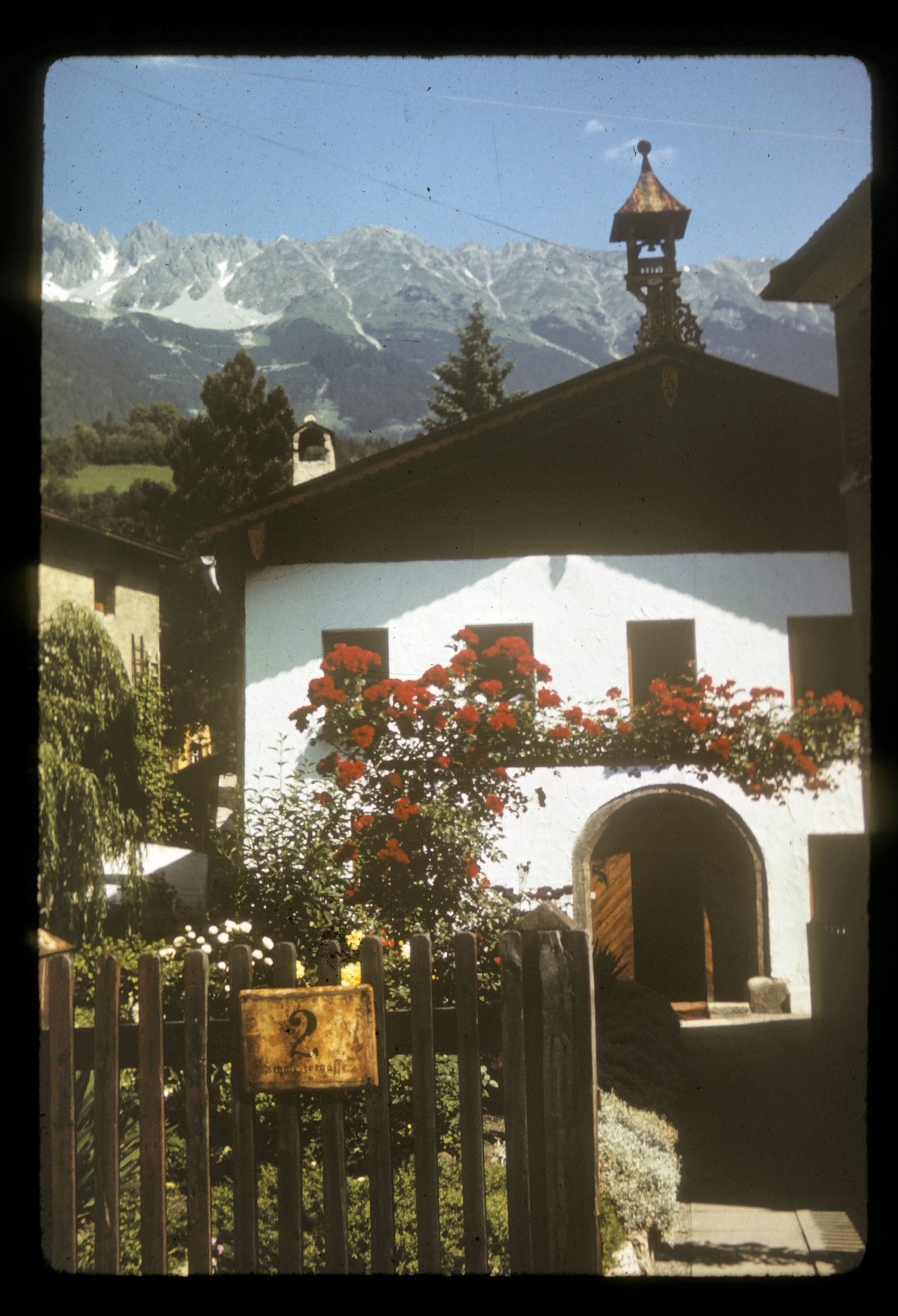
And this next one is on a bridge over the Inn river, not the main bridge for which the city was named, but one just 100 yards from the house. The house was across the street from the church in the background. The guy in the middle is Jim O’Connell, my roomate. The one furthest from the camera lived across the hall. And yes, that’s me on the right:
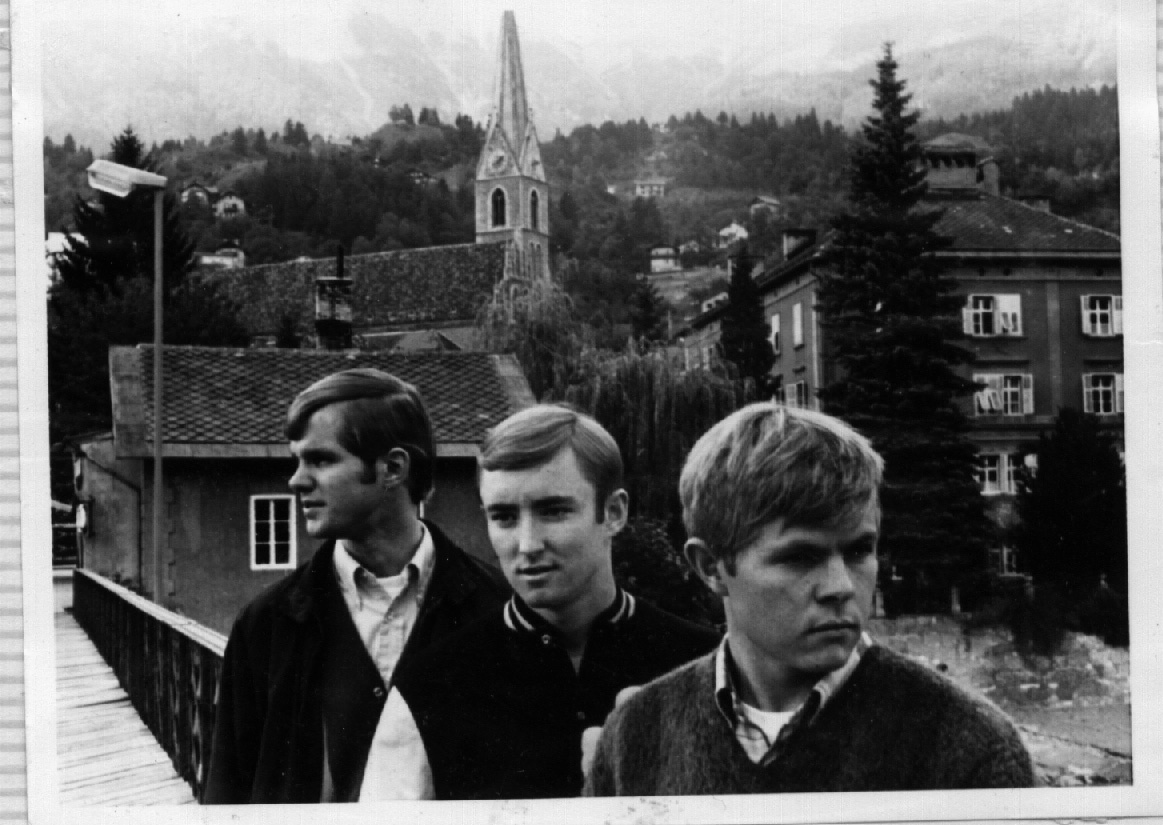
In this picture I’m on the balcony of the room I shared with Jim:
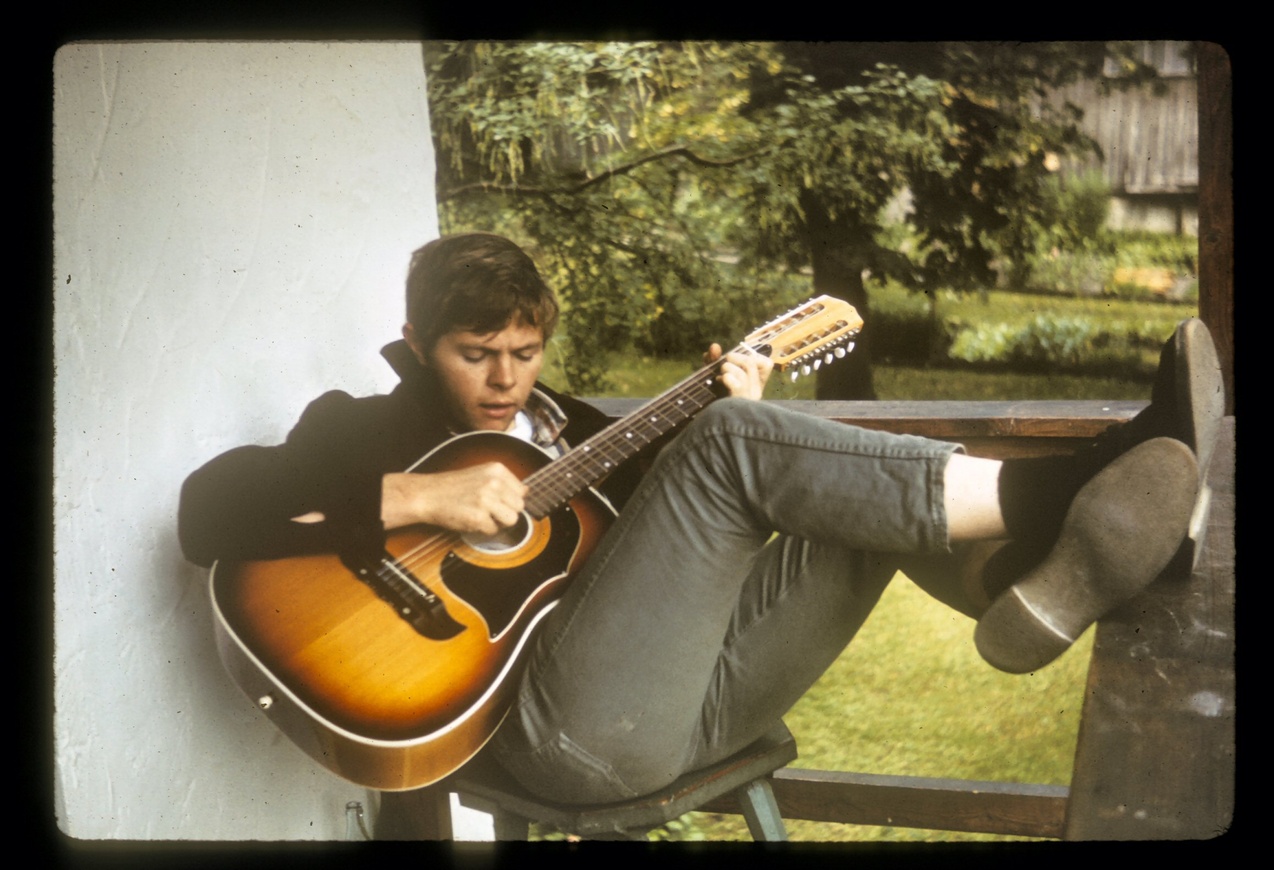
The following are pictures of Innsbruck:
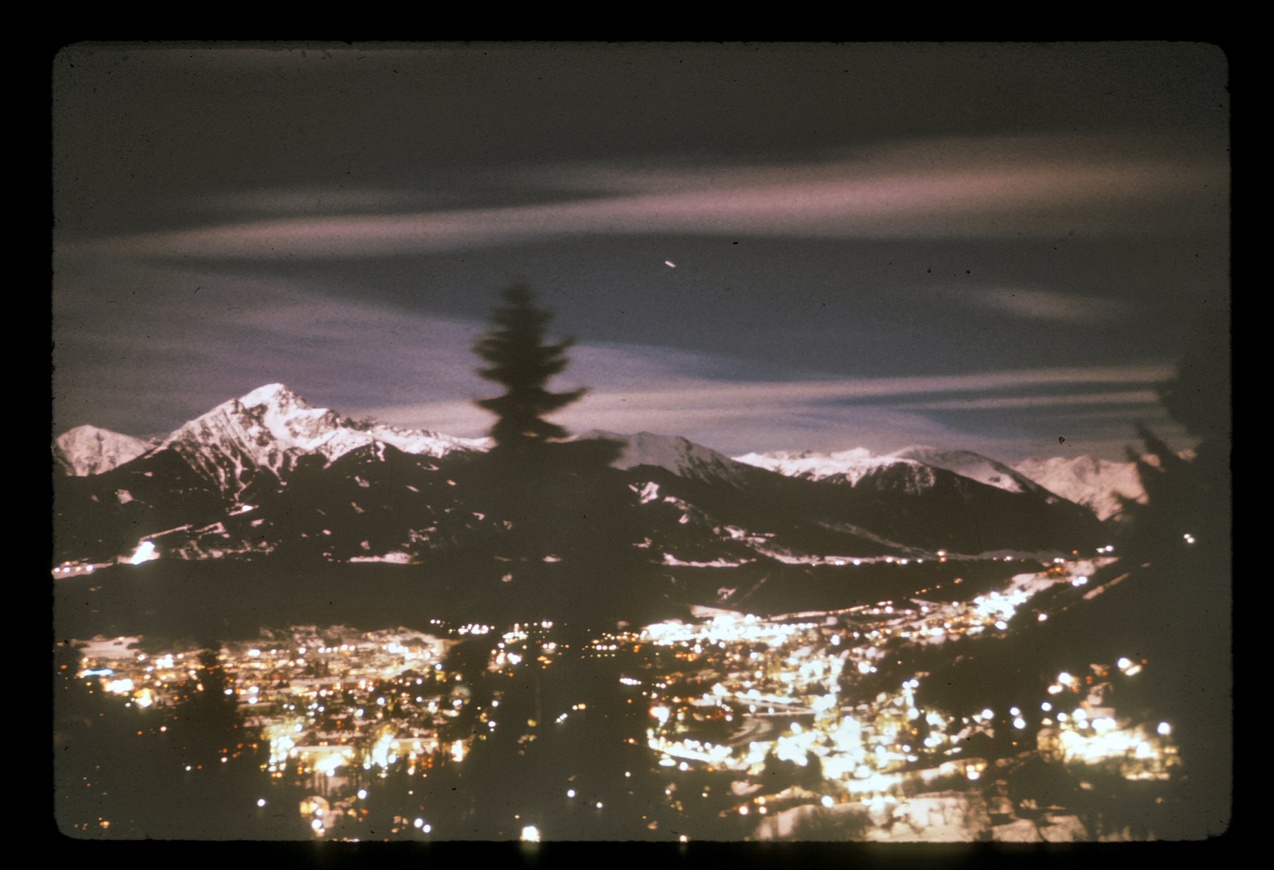
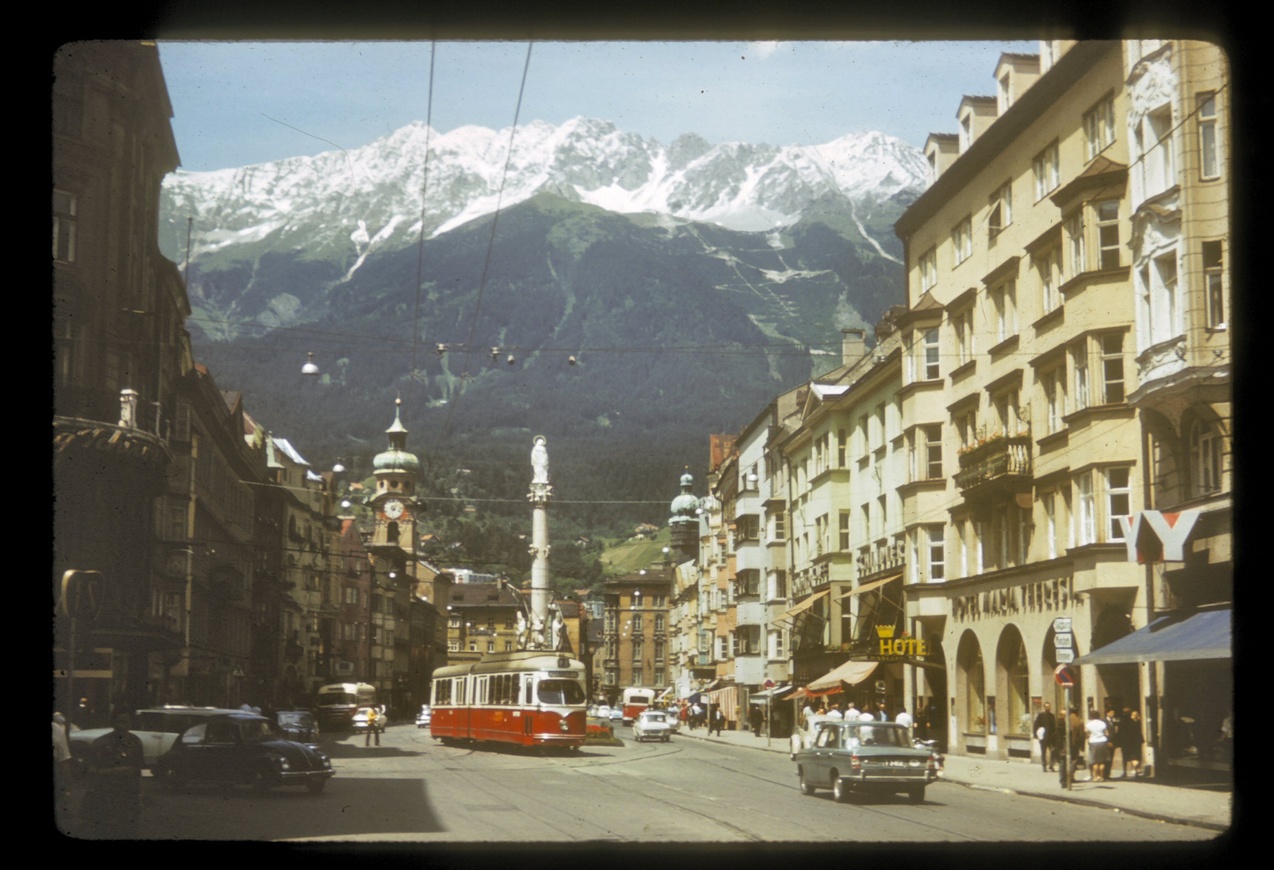
In November four of us took a train to Venice, and found it flooded, a common occurrence:
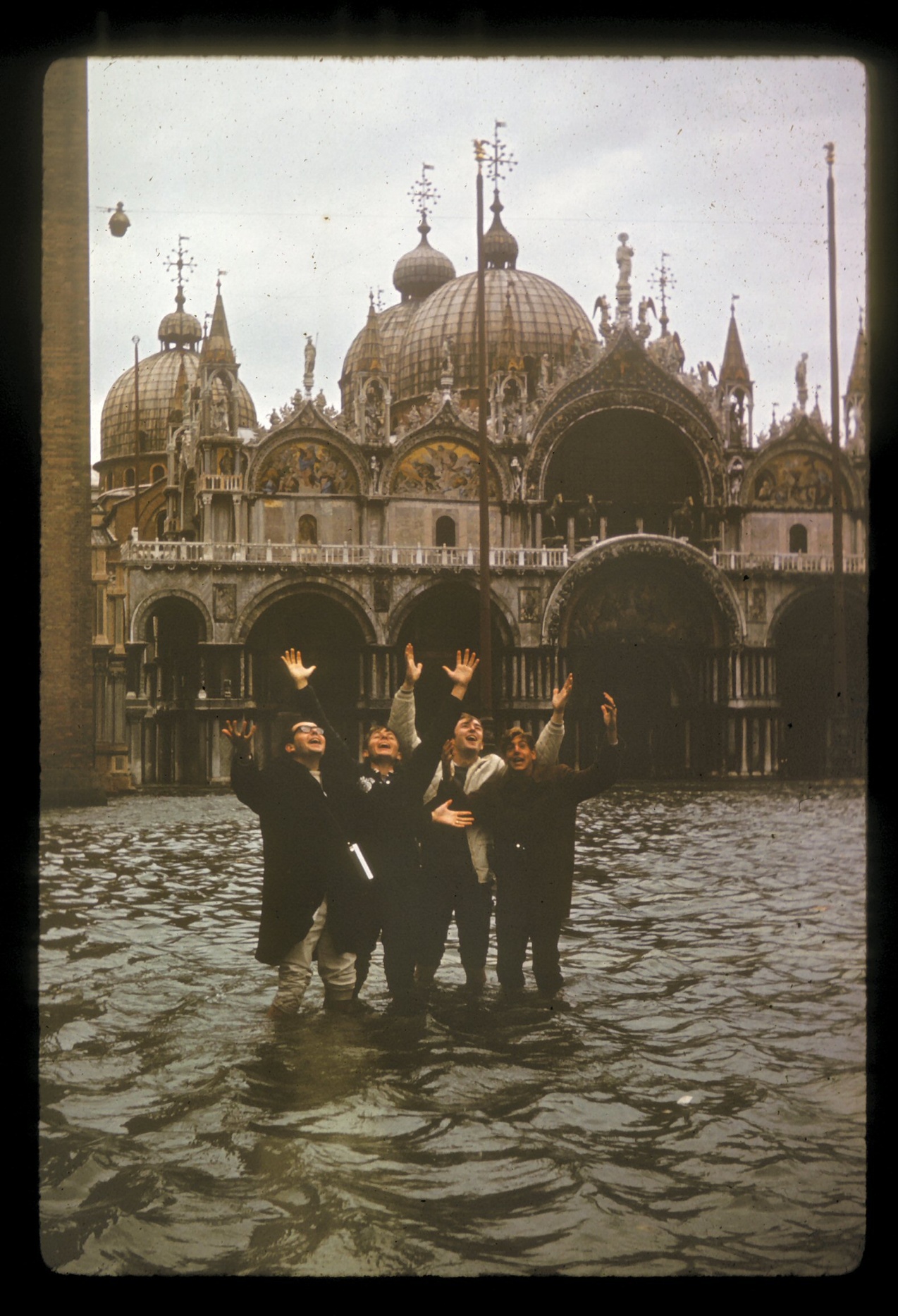
Over the Christmas break, a group of us took trains down to Florence, then Rome …
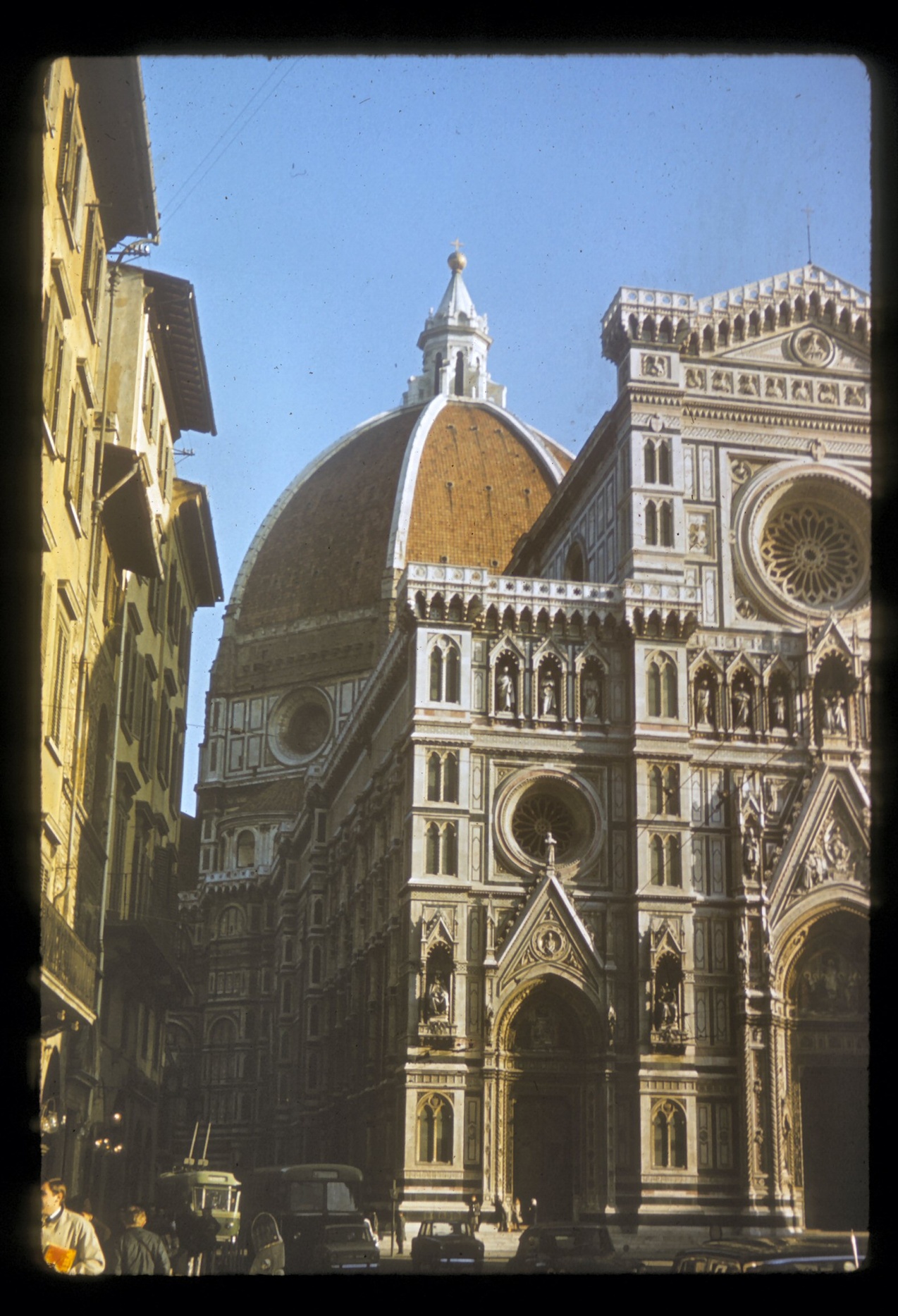
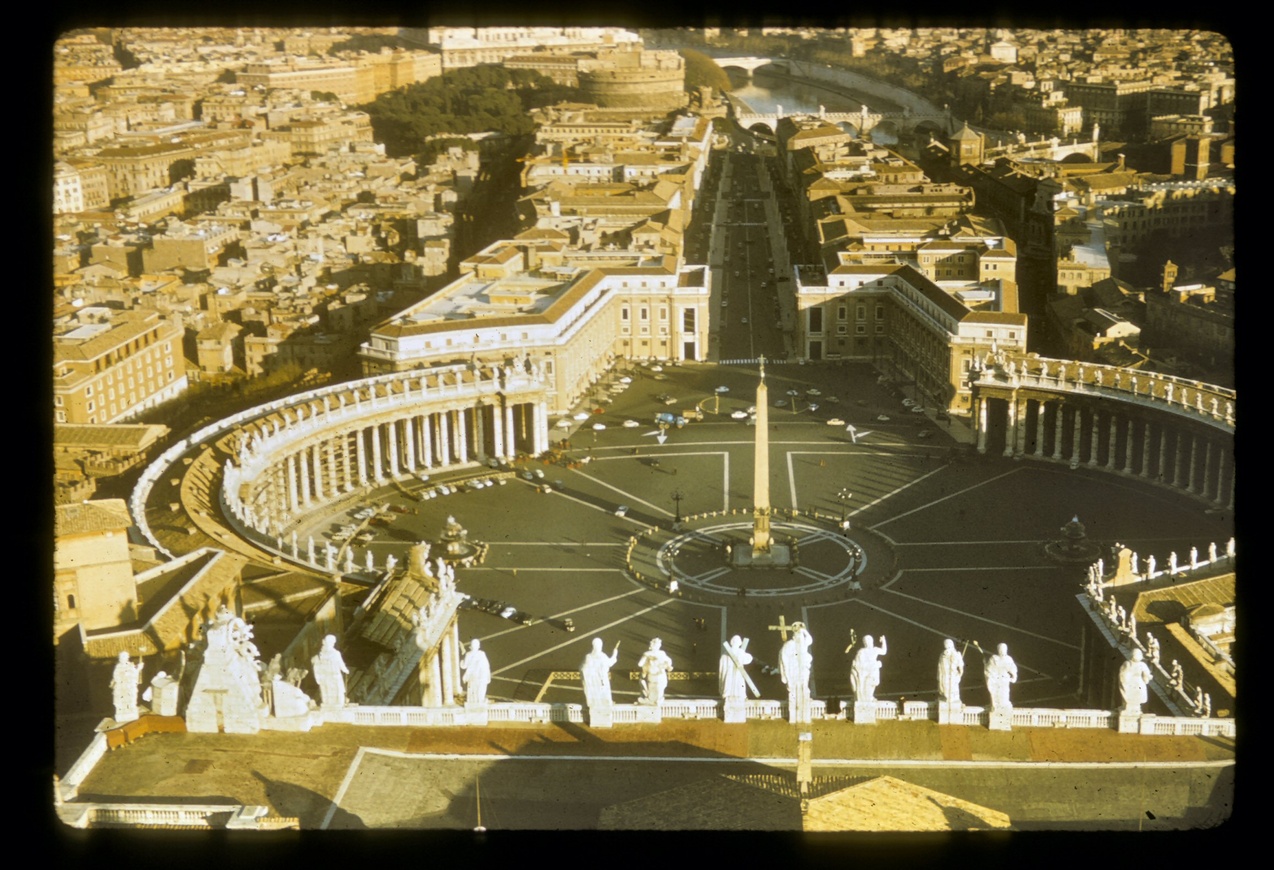
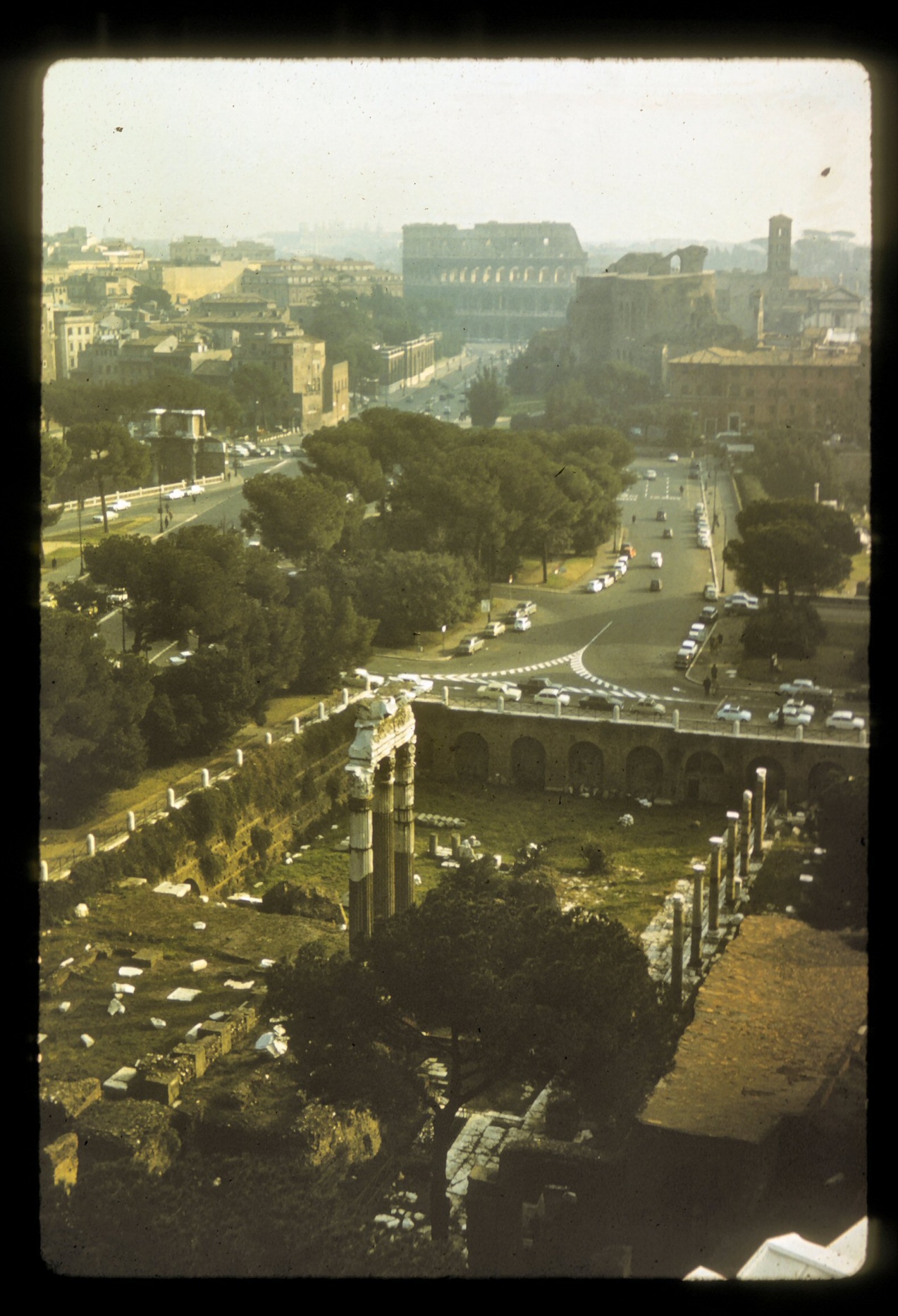
… and on to Brindisi, in the eastern tip of Italy, where we caught an overnight ferry to Corfu, in Greece. And on in trains to Athens, then Istanbul, and then two days on the train back from Istanbul through Bulgaria and Yogoslavia to Innsbruck.
Before the train ride, which took all night, all the next day, and then all the following night, we pooled our meager resources and gave our cash to Colm Gage, one of the group, to buy food and drink for the journey. Colm, however, arrived at the train with only apologies and reasons why not. That made for a very interesting trip, with only enough money for a few rolls. Some young men took pity on us in Yugoslavia, and shared some food.
February of that year I bought my Volkswagen, using Dad’s money, for way less than it would have cost in the US. The deal was that Europe was so cheap back then you could buy a new VW, use it for the year, ship it to the US, and sell it used in the US for considerably more than you’d paid for it new in Germany. I was the eighth in the group to do it, all the others having been quicker on the draw, which meant they got to use it all year, not just the last few months. None of us actually sold the cars to make the profit. We kept them. Mine sat at home for my third year at Notre Dame, and then my parents gave it to me for my senior year.
I picked the car up in Munich. Two days later, as I sat waiting for a red light in Innsbruck, somebody backed a car out of a diagonal parking space and dented the side. Insurance worked.
That car took me skiing every day. My friends counted 63 class days in a row that I missed class because I was up skiing, accompanied by different members of the group.
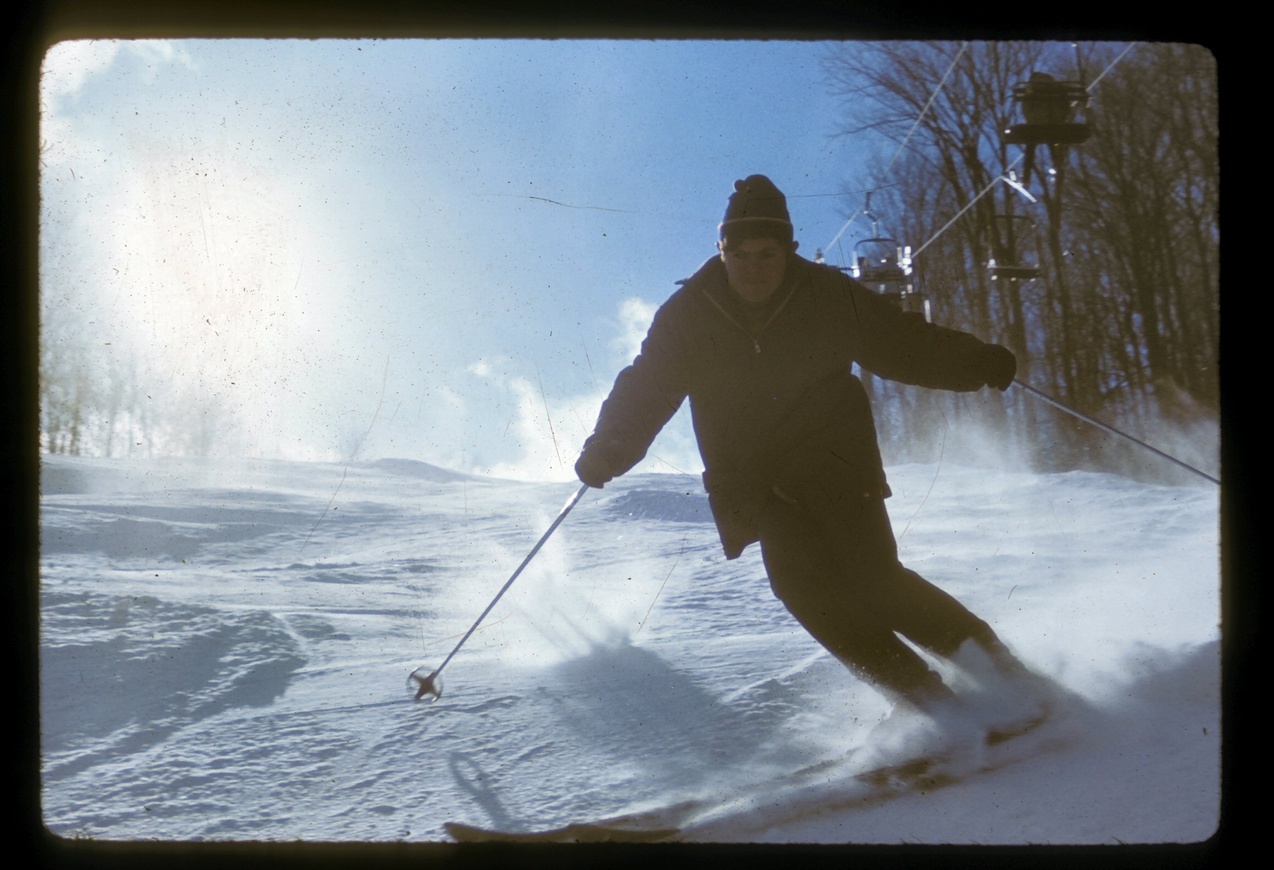
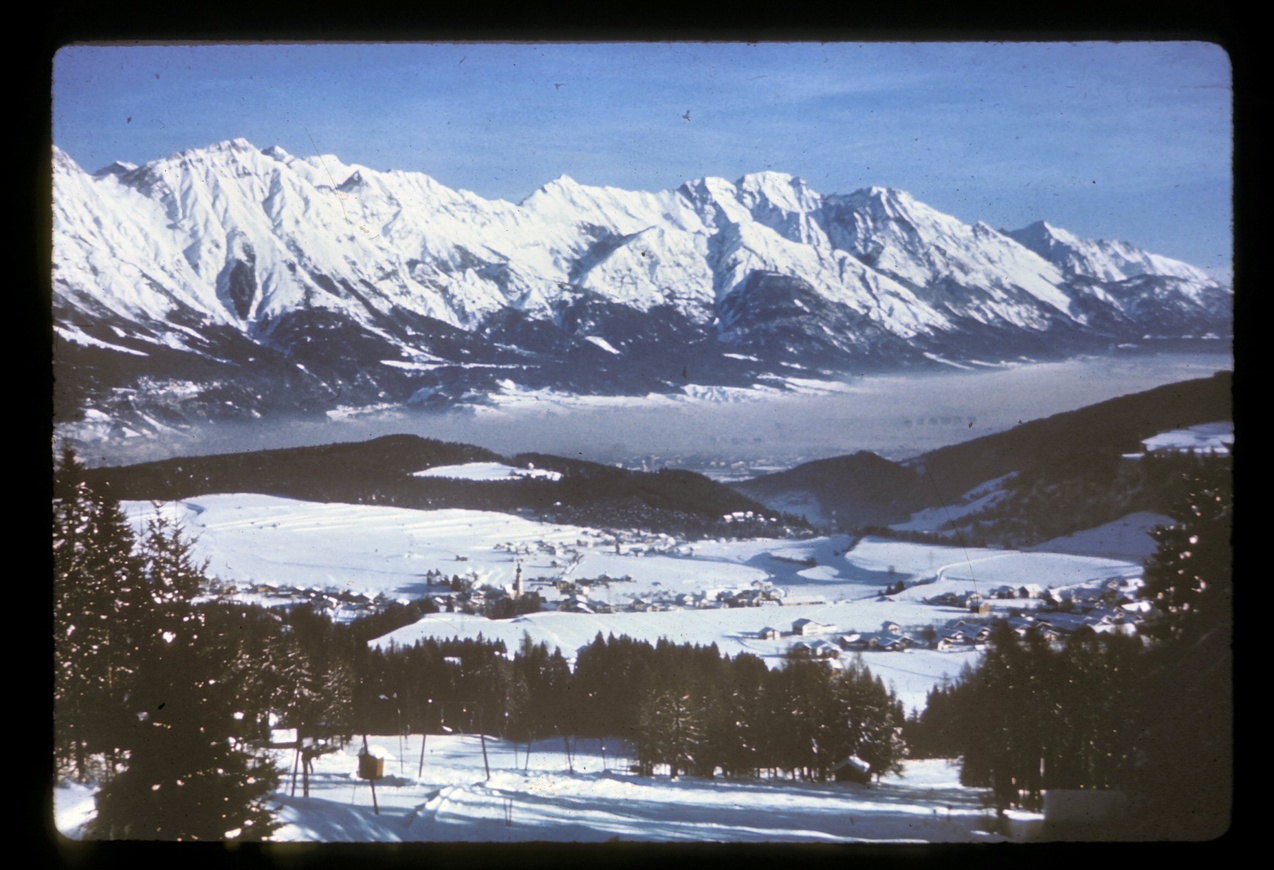
On the big spring break that year, that car took me and three friends through Germany, northern France, England, and Wales; and back.
That car also got me very close to jail for drunk driving. It was at a “green beer” (meaning fresh, just brewed, the first batches of the season) festival up the river from Innsbruck. I drove with friends. And, being young and foolish,
And it was 1968. We sat in the breakfast room together each morning, so we shared the news of Robert Kennedy being shot, and then, a few weeks later. Martin Luther King. We read about riots in the cities. We felt far away, but still, dismayed.
I spent my last two weeks in Europe alone in Paris. I’d failed to coordinate with friends. So I spent the days walking through a gorgeous summer in Paris; and the nights pretty much alone in a cheap hotel room on the West Bank, listening to windows breaking and tear gas pops and the other sounds of student riots. It wasn’t just Paris; it was also all over the US and major cities in Europe and Asia. I participated in student demonstrations in the US before and after, but in Paris, that time in 1968, I stayed inside, feeling very American. And that, in the days of the Vietnam War and police violence opposing integration, was not a good thing to be, in the left bank in Paris in the summer of 1968.
